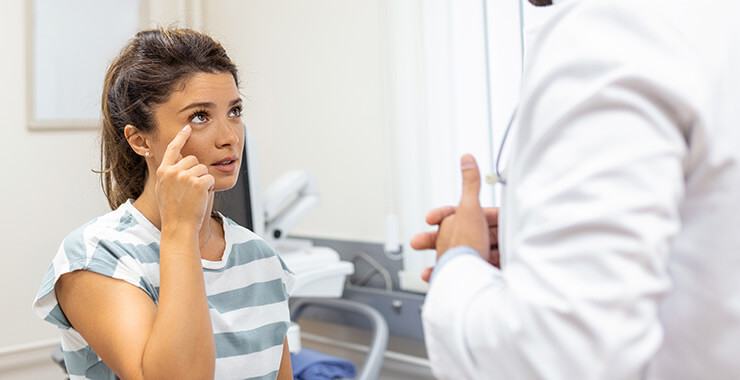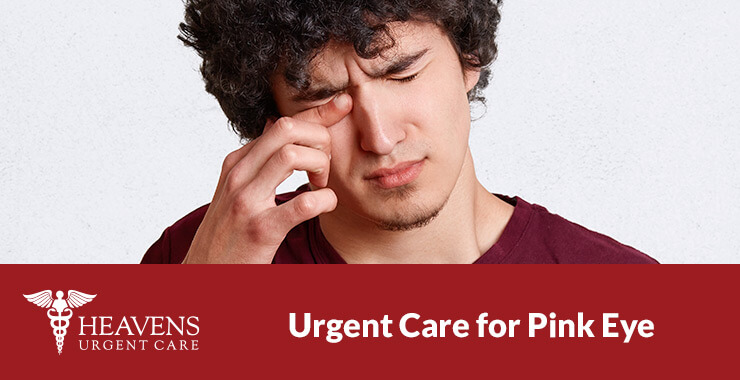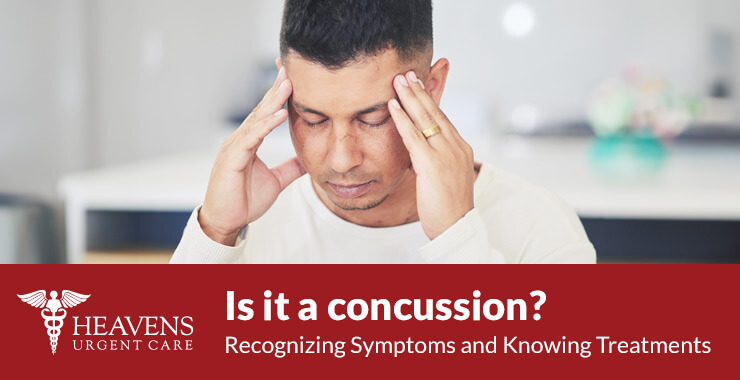Urgent care doctors see a lot of cases of pink eye, also known as conjunctivitis. This common eye infection can be a pesky and uncomfortable condition, but fortunately, it is easily treated with the right care.
First, it’s important to know that pink eye is a very common and highly contagious eye condition that affects millions of people, and urgent care medical offices, like Heavens Urgent Care are uniquely set up to see, diagnose, and treat this irritating and often painful condition quickly and affordably.
So, let’s jump right into the causes, symptoms, treatment options, and prevention techniques for pink eye, to help you manage this pesky virus.
What is Pink Eye?
Pink eye is an inflammation or infection of the transparent membrane (conjunctiva) that covers the whites of the eyes and lines the inner surface of the eyelids. The condition can be caused by bacteria, viruses, allergens, or irritants. Source: National Library of Medicine
Symptoms of Pink Eye
Common symptoms of pink eye may vary depending on the cause but often include:
- redness
- itching
- grittiness
- swelling
- a discharge that may be yellow or green in color
- sneezing and runny nose
- ear infection
- burning
- in severe cases, patients may also experience blurred vision and light sensitivity

What are the major causes of Pink Eye?
Viral conjunctivitis
(commonly adenovirus)
The most common type of pink eye is viral conjunctivitis. The condition is usually caused by the same virus that sets off the sore throat and runny nose of a common cold. Viral conjunctivitis is considered highly contagious and can infect one or both eyes at the same time.
Bacterial conjunctivitis
(Staphylococcus aureus or Streptococcus pneumoniae)
If you are noticing gobs of sticky pus in the eye along with a pink color in the conjunctiva, you probably have bacterial conjunctivitis. It’s also not uncommon for the bacterium to cause almost no discharge. Bacterial conjunctivitis can also be responsible for causing strep throat. This form of pink eye is also highly contagious.
Allergic conjunctivitis
Allergic conjunctivitis is not contagious. Its main symptoms include itchy, burning eyes that tear up, with eyelids that can also become puffy and turn red. Allergic conjunctivitis is caused by an allergic response to certain substances like animal dander, chlorine, pollen, cigarette smoke, other chemicals, or contact lens misuse.
How Pink Eye is Spread
Pink eye is typically spread through direct contact with an infected person or by touching surfaces that have come into contact with the virus or bacteria. This is why it is important to teach children the practice of good hygiene, like frequent hand washing with warm water and soap. It’s also best to avoid sharing towels or pillows with someone who has pink eye.
When to Seek Medical Attention for Pink Eye
If you experience persistent eye pain, severe vision changes, marked redness and swelling, blurred vision, or symptoms persisting after a few days, we recommend that you seek medical advice promptly.
A healthcare provider will evaluate your symptoms, medical history, and perform an examination to diagnose the specific type of pink eye. In certain cases, a swab or culture may be collected from the eye to identify the responsible organism.
Viruses cause up to 80% of all cases of acute conjunctivitis. The rate of clinical accuracy in diagnosing viral conjunctivitis is less than 50% compared with laboratory confirmation. Many cases are misdiagnosed as bacterial conjunctivitis. SOURCE: National Institute of Health
How Pink Eye is Treated
Bacterial conjunctivitis is commonly treated with antibiotic eye drops or ointments. It is essential to complete the full course of medication as prescribed to prevent recurrence and reduce the spread of infection.
As viral conjunctivitis typically resolves on its own within a week or two, treatment mainly focuses on symptom relief. However, antiviral eye drops may be prescribed in severe cases.
For allergic conjunctivitis, avoiding the allergen is key. Over-the-counter antihistamine eye drops, artificial tears, and cold compresses can help soothe symptoms. In severe allergic cases, prescription medications such as antihistamines or corticosteroids may be recommended.
Most cases of pink eye resolve on their own within a few days to a week but seeing a doctor for a proper diagnosis and treatment can help speed up the recovery process.
Relief From Pink Eye at Home
To minimize the spread of pink eye practice good hygiene with regular handwashing, especially before and after touching the eyes. Avoid sharing personal items like towels, makeup, and eye drops. Here are some things to try at home for symptom relief:
- Using warm compresses
- Gently cleaning your eyelids with warm, purified water
- Avoiding eye makeup
- Wearing sunglasses
- Using over-the-counter artificial tears or lubricating eye drops to keep eyes moisturized and to relieve dryness
Why Choosing an Urgent Care for Pink Eye is Best
Now, let’s talk about why choosing an urgent care facility for the treatment of pink eye can be advantageous. Urgent care centers are a convenient and cost-effective option for minor illnesses and injuries, like pink eye. Unlike emergency rooms, where wait times can be long and costs can be high, urgent care centers offer quick and efficient care without the need for an appointment.
At a facility like Heavens Urgent Care, you can receive prompt treatment for pink eye from experienced medical professionals without having to wait days for an appointment with a primary care physician. This can be especially important if you are experiencing severe symptoms or need immediate relief from discomfort.
Can I get an online prescription for Pink Eye?
Yes! It is possible to get a prescription for pink eye but it does require a diagnosis from a licensed healthcare provider. If you are in Arizona, you can start a virtual appointment with Heavens Urgent Care and after your provider reviews your symptoms they will determine your treatment plan which may include a prescription.
Even though it’s a common eye infection, pink eye can be easily and quickly treated with the right care. By practicing good hygiene and seeking prompt medical attention from an urgent care facility, you can quickly recover from pink eye and prevent the spread of infection to others. Don’t let pink eye keep you down – visit your nearest urgent care center for fast and convenient treatment today.
Virtual or In-Person Appointments
If you suspect that you have pink eye, stop by our Heavens Urgent Care office in Apache Junction for testing. No appointment is needed or click here to start a virtual urgent care appointment.







